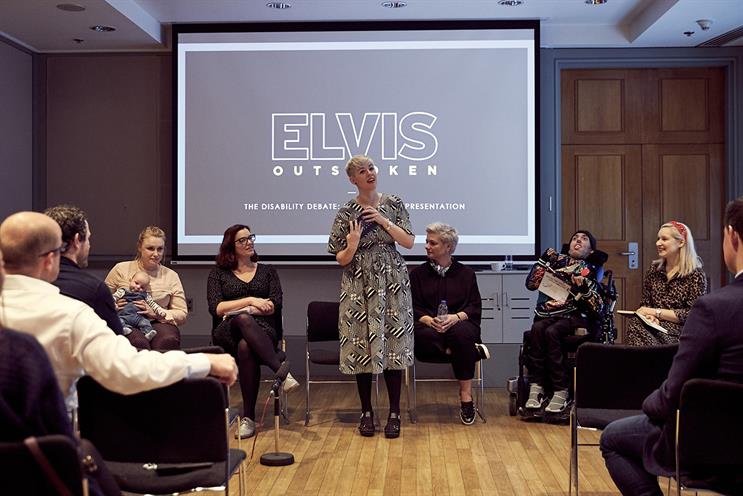There are more than 11 million disabled people in the UK and approximately one billion worldwide. So why do only 0.06% of ads feature people with disabilities? That’s where the discussion began at last week's Elvis Outspoken event, "The Disability Debate: More than Representation", at the National Gallery, attended by agency leaders, marketeers, charities, influencers, talent and recruiters.
I was part of a panel chaired by 北京赛车pk10’s Nicola Kemp that also featured Sulaiman Khan, founder and chief purpose officer at ThisAbility; Michele Oliver, global vice-president, corporate brand and purpose, at Mars; and Zoe Proctor and Laura Johnson, founders of Zebedee Management. Our discussion aimed to explore why more brands aren’t following the great examples set by the likes of Maltesers and River Island when it comes to the representation of disability and to try to understand what’s getting in the way.
Is it ignorance, fear of getting it wrong or our British awkwardness that stops us from embracing disability or even talking about it in our organisations? Why, when rolling out the same lines on diversity, do we as an industry never really seem to go there?
Drawing on my own experience, it wasn’t until I became a mother that I started to ask these questions. My daughter was born with a rare chromosome condition that meant I very quickly had to think about disability for very personal reasons. At the point of her diagnosis, I had always considered myself to be a fair, liberal and inclusive person. Turns out I was nowhere near that when it came to disability. That realisation, and everything that came with it, got me wondering why agencies like Elvis, filled with highly intelligent, strategic and creative people, are still struggling to have the disability conversation. That had to change, so this is why running this event was so important to me.
Diversity is a concept that all of us embrace, discuss and even use to promote our agency offerings these days. But ask yourself this: when you talk about diversity, are you including disability? Probably not. And if that’s the case, you’re not alone. Perhaps it just hasn’t affected you directly yet or you simply don’t know where to start. So here are five key areas with tangible actions that you can begin to apply to your businesses today to make a difference.
Education
Look at your organisation and seek whatever support you need in order to educate your people.Call on and spend time with charities such as Scope, Leonard Cheshire and Chickenshed to help you with everything from language to training. Make a conscious effort to talk about disability openly in your business.
Tools
Grow collective confidence by equipping your teams with diversity statements that are inclusive of disability. Provide them with a safe environment where they can ask questions without fear of getting it wrong and encourage them to contribute. Support your people with information and training on how to sell inclusive work and what to say or do when challenged by anyone who doesn’t appreciate its value.
Talent
Insist that the casting process includes businesses such as Zebedee Management, which has supplied diverse talent for campaigns by McCain, Marks & Spencer, Tia Maria, Grazia and many more. Examine your HR and recruitment policies. Are they truly inclusive? Challenge yourself and your suppliers to find diverse candidates by looking in different places. Engage with the likes of United Response, a charity that works collaboratively to offer disabled adults placements in order to help find them careers.
Accessibility
Is your space accessible for disabled staff, clients and visitors? Disabled people are disabled by society, not their condition, so don’t fall into the trap of expecting a declaration from them upfront. If your space isn’t accessible, think about what you can do to avoid exclusion. Proactive and small changes such as suggesting meetings take place in accessible spaces off-site and embracing remote working will make a lack of accessibility less problematic until you can make larger, structural changes.
Representation
When it comes to the representation of disabled people in your creative output, just start. Don’t fear shouts of "tokenism". This isn’t just the right thing to do – it makes business sense. With the global disabled community holding an estimated annual disposable income of approximately $200bn, there’s a strong commercial argument for ensuring our work reflects this audience.
Making our industry more inclusive of people with disabilities may feel like a huge challenge, but we can all do our bit – starting now.
Emma Gardner is managing partner at Elvis


